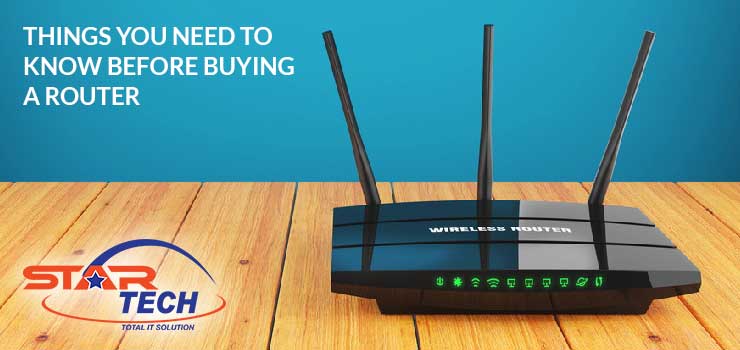A router is an indispensable device for transmitting Internet connection at your home, office or company. There are many types of routers on the market at the different price range. You can understand the general specifications of a router from the following discussion which will help you choose the most suitable router for your work.
1. Standard
Routers use 802.11- based standard. Most of us do not understand the standards, so here is an easy description:
- *802.11 – This is the original standard with 2.4GHz with maximum speed 2mbps. It is slow and very low in the range.
- *802.11a — With 5GHz Band and provides up to 54Mbps speed.
- *802.11b —It is the first big Wi-Fi standard adopted by consumers which use 11 Mbps transmission on a 2.4GHz band.
- *802.11e/g — With QoS (Quality of Service) and multimedia support. An old and common consumer standard.
- *802.11n —With an increased range and various features of previous standards, Maximum speed 100Mbps.
- *802.11ac —With speed up to 1.3 Gbps and operates at 5GHz exclusively.
2. USB
Expensive and even some of the inexpensive routers have USB ports. USB devices which do not have wireless network support can be plugged into those port to make it a network device.
There should be at least one USB port and preferably one that is USB 3.0. USB ports allow you to create a shared network drive FTP or HTTP server). You can also connect a printer to the router and let others have the facility of a printer sharing.
3. Band
A single band router will provide single 2.4ghz network, while a dual brand router can provide both 2.4ghz and 5ghz band. If you live in a crowded place with too much interference, and if there are many users, you should go for dual band. Otherwise, a single band is enough.
4. Security
You should buy the routers with WPA2 support which is the best standard for Wi-Fi encryption virtually. Most of the router supports this security system. You can also keep an eye to see if a router also supports additional security features such as Double firewall protection (SPI and NAT), Denial-of-service (DoS) attack prevention etc.
5. Multiple Antennas
External antennas increase the range of routers and it suitable for the situation there are multiples barriers like walls or glass doors. Also, if you need a router to cover a huge area, go for multiple antennas.
6. Compatibility
You should ask your technician to know if your system demands additional compatibility. There are a different number of ports (LAN/Ethernet cables, WAN, USB etc.) in different routers.
Some routers support SIM card operated modems through USB ports. Some routers can be accessed remotely, even from a smart TV or smartphone. All the details can be found in the product description area.
7. Popular Brands
Do not buy routers of uncommon brands no matter how affordable their price range is. In Bangladesh, you should choose your desired routers from the popular brands like TP-Link, TOTOLINK, Mikrotik, Tenda, D-Link, Mi Router, NETGEAR, Netis, ASUS, Cisco, LINKSYS, Mercurys, and PROLINK. Also, buy routers from a reliable shop that provides genuine warranty and after-sales service.
For your kind information, Star Tech has been providing its beloved customers with all the latest routers at the lowest possible cost. You don’t have to come to the shop by yourself, you can check the price and specification of routers in Bangladesh from Star Tech website and order your desired product to get it delivered to your doorstep.
We need not buy a router with a data rate above 300 Mbps if your devices do not support it. The router should support WPA2 encryption. Additional features are not the requirements but they are good to have. So you need to be concerned about these for buying a router.










Comments
There are no comments for this Article.